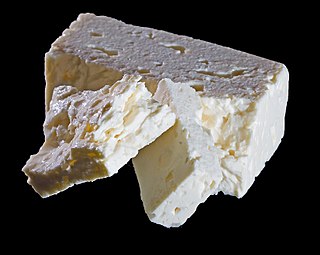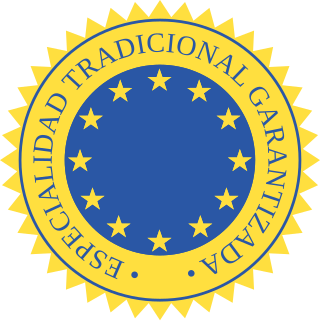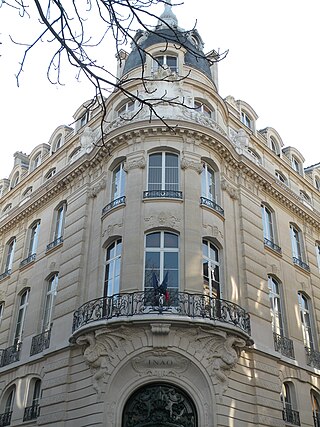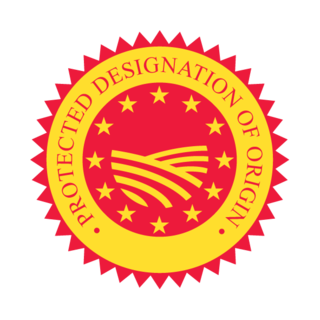
Manchego is a cheese made in the La Mancha region of Spain from the milk of sheep of the Manchega breed. It is aged between 60 days and 2 years.

Feta is a Greek brined white cheese made from sheep's milk or from a mixture of sheep and goat's milk. It is soft, with small or no holes, a compact touch, few cuts, and no skin. Crumbly with a slightly grainy texture, it is formed into large blocks and aged in brine. Its flavor is tangy and salty, ranging from mild to sharp. Feta is used as a table cheese, in salads such as Greek salad, and in pastries, notably the phyllo-based Greek dishes spanakopita "spinach pie" and tyropita "cheese pie". It is often served with olive oil or olives, and sprinkled with aromatic herbs such as oregano. It can also be served cooked, as part of a sandwich, in omelettes, and many other dishes.

A traditional speciality guaranteed is a traditional food product protected under European Union and/or United Kingdom law. This label differs from the geographical indications protected designation of origin (PDO) and protected geographical indication (PGI) in that the TSG label does not certify that the protected food product has a link to a specific geographical area, and thus a product can be produced outside the area or country from which it originates.

Three European Union schemes of geographical indications and traditional specialties, known as protected designation of origin (PDO), protected geographical indication (PGI), and traditional speciality guaranteed (TSG), promote and protect names of agricultural products and foodstuffs, wines and spirits. Products registered under one of the three schemes may be marked with the logo for that scheme to help identify those products. The schemes are based on the legal framework provided by the EU Regulation No 1151/2012 of the European Parliament and of the Council of 21 November 2012 on quality schemes for agricultural products and foodstuffs. This regulation applies within the EU as well as in Northern Ireland. Protection of the registered products is gradually expanded internationally via bilateral agreements between the EU and non-EU countries. It ensures that only products genuinely originating in that region are allowed to be identified as such in commerce. The legislation first came into force in 1992. The purpose of the law is to protect the reputation of the regional foods, promote rural and agricultural activity, help producers obtain a premium price for their authentic products, and eliminate the unfair competition and misleading of consumers by non-genuine products, which may be of inferior quality or of different flavour. Critics argue that many of the names, sought for protection by the EU, have become commonplace in trade and should not be protected.
Balsamic vinegar is a dark, concentrated, intensely flavoured vinegar originating in Modena, Italy, made wholly or partially from grape must: freshly crushed grape juice with all the skins, seeds and stems.

In France, the appellation d'origine contrôlée (AOC) is a label that identifies an agricultural product whose stages of production and processing are carried out in a defined geographical area – the terroir – and using recognized and traditional know-how. The specificity of an AOC product is determined by the combination of a physical and biological environment with established production techniques transmitted within a human community. Together, these give the product its distinctive qualities.

Nyons is a subprefecture of the Drôme department in the Auvergne-Rhône-Alpes region in Southeastern France. In 2021, the commune had a population of 6,771.

Jamón is a type of dry-cured ham produced in Spain. It is one of the most globally recognized food items of Spanish cuisine. It is also regularly a component of tapas.

Salade niçoise is a salad that originated in the French city of Nice. It is traditionally made of tomatoes, hard-boiled eggs, Niçoise olives and anchovies or tuna, dressed with olive oil, or in some historical versions, a vinaigrette. It has been popular worldwide since the early 20th century, and has been prepared and discussed by many chefs. Delia Smith called it "one of the best combinations of salad ingredients ever invented" and Gordon Ramsay said that "it must be the finest summer salad of all".

Bergkäse refers to a number of varieties of cheese produced in the Alps. This includes products of mountain farming, the cultivation of alpine pastures as well as the milk processing of local producers in dairies. The term does not say much about the type or production method of the product called mountain cheese, which is usually a hard or semi-hard cheese with no or little holes, usually with a natural rind, but there are also semi-hard cheeses and soft cheeses under this designation. The term is used also generically for Swiss-type or Alpine cheeses, which resemble these in taste and texture but do not come from one of the traditional cheese making regions. The texture is rather hard, sometimes with small holes or cracks, the flavour strong and often a bit nutty.

The United Kingdom is a major consumer of wine, although a minor grower and producer. Wine production in the UK has historically been perceived as less than ideal due to the cold climate, but warmer summers and grapes adapted to these conditions have played a role in increasing investment and sale of wines. Most is English sparkling wine, from vineyards across Southern England and sparkling wine from Wales where the climate is warmer than that of northern areas. Vineyards are becoming more commonplace in counties such as Essex, Sussex and Kent, where more varieties of wine can be produced due to the drier and warmer climate.

Pissalat or pissala is a condiment originating from the Nice region of France. The name comes from peis salat in Niçard and means 'salted fish'. It is made from anchovy puree flavoured with cloves, thyme, bay leaf and black pepper mixed with olive oil. Pissalat is used for flavouring hors d'oeuvres, fish, cold meats and, especially, the local specialty, pissaladière.

The Kalamata olive is a large, dark purple olive with a smooth, meaty texture, named after the city of Kalamata in the southern Peloponnese, Greece. Often used as table olives, they are usually preserved in wine vinegar or olive oil. Typically the term "Kalamata" legally refers to a region of Greece where these olives are grown, but a few countries use the name for such olives grown anywhere, even outside of Greece. Within the EU, the name is protected with PDO status, which means that the name can only be used for olives from the region around Kalamata. Olives of the same variety grown elsewhere are marketed as Kalamon olives in the EU and, sometimes, elsewhere.

The Cailletier, also known in English by the Italian name Taggiasca, is a cultivar of olives grown primarily in the Alpes-Maritimes region near Nice and the Riviera di Ponente, Italy. It is best known under the name Niçoise, which signifies its curing method. It is commonly used as an important ingredient in the salade niçoise. It can also be used for the production of oil. This cultivar is particularly susceptible to the olive fruit fly.

Ladotyri Mytilinis is a traditionally prepared Protected Designation of Origin (PDO) cheese from Greece, preserved in extra virgin olive oil.

The extra-virgin olive oil Terre Tarentine is produced with the olive cultivars Leccino and Coratina and Ogliarola for, at least, 80%. They are mixed with other minor varieties of the local olive groves. It is recognised as PDO product.

The protected designation of origin (PDO) is a type of geographical indication of the European Union aimed at preserving the designations of origin of food-related products. The designation was created in 1992 and its main purpose is to designate products that have been produced, processed and developed in a specific geographical area, using the recognized know-how of local producers and ingredients from the region concerned.
















